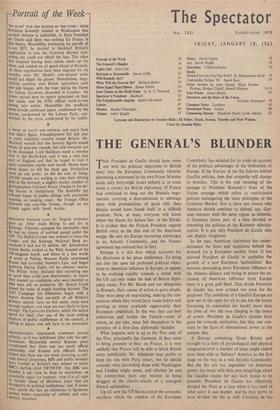—Portrait of the Week— `GO SLOW' WAS THE SLOGAN OF
THE WEEK: while President Kennedy insisted in Washington that nuclear defence is indivisible, in Paris President de Gaulle said there was nothing for France in this theory. Meanwhile, continuing his parody of Louis XIV, he decided to blackball Britain's application to join the Common Market club, saying she could not afford the fees. The other five resented having their minds made up for them, and insisted on all speed ahead at Brussels. As these negotiations have been stagnant for six months, even Mr. Heath's ever-present smile could not dispel the gloom. Nevertheless, nego- tiations continue over British agriculture until one side breaks, with the loser taking the blame for failure. Go-slows abounded in London: the Power unions were no nearer agreement on their Pay claim, and the ETU official work-to-rule swung into action. Meanwhile the unofficial work-to-rule continued apace, condemned by the unions, condemned by the Labour Party, con- demned by the press, condemned by the public.
A WEEK OF FACTS AND FIGURES, and many facts that didn't figure. Unemployment fell last year in every industrial country except Britain. Mr. Macleod warned that the January figures would break all post-war records, but told everyone not to be dismayed. Lord Hailsham made a one-day visit to the North-East. said it was a very nice part of England and that he hoped to visit it again sometime, maybe next month. Home loans Came down; so did the trade gap. Production went up one point: so did the cost of living; 335,000 people are waiting to take their driving tests at the moment; a slightly smaller number of photographers followed Prince Charles in his ski- ing lessons in Switzerland. The Radcliffe spy tribunal began its public sittings with journalists insisting on keeping mum: the Foreign Office, followed suit over*the Yemen, though we are friends again with Saudi Arabia.
PRESIDENT TS HoM BF GAVE IN: English cricketers gave up. After much flitting to and fro in Katanga, Tshombe accepted the inevitable—that he had no chance of survival except under the UN. The British Consul was ordered to leave the Congo, and the Katanga National Bank an- nounced it had lost £3 million. Mr. Khrushchev visited Berlin, looked at the Wall, boasted of his 100-megaton bomb, and threw in a few words of scorn at Peking. Moscow Radio announced Russia had corrected Newton's Law, and began Jamming Peking Radio for no obvious reason. The British Army declared that recruiting was so good they could now discriminate: in future they wanted no candidates who, were married or w. ho were still on probation. Mr. Selwyn Lloyd Joined the ranks of tenpin bowling tycoons. The 1963 Campaign for Education began with a report showing that one-sixth of all Britain's Primary schools have no hot water, none have enough teachers, and none are ever likely to have enough. The Leonardo Cartoon, which the nation saved for itself after one of the most striking displays of public indifference of the centorY, is falling to pieces, and will have to be renovated.
* SHOSTAKOVICH'S THIRTEENTH SYMPHONY proved unlucky, as it was withdrawn after only two per- formances. Meanwhile several Russian poets complained that there was too much official censorship, and Russian arts officials darkly hinted that there was too much clowning, a criti- cism several clergymen, MPs and public moaners have levelled at Britain's own answer to satire, BBC's darling child TWTWTW. The BBC also decided it was time to drop its restrictions on unsuitable topics for humour: now it is all right to include 'abuse of Ministers, jokes that are derogatory to political institutions,' and, if neces- sary, ignore the ban on references to fig-leaves, animal habits (especially of rabbits) and com- mercial travellers.






























 Previous page
Previous page